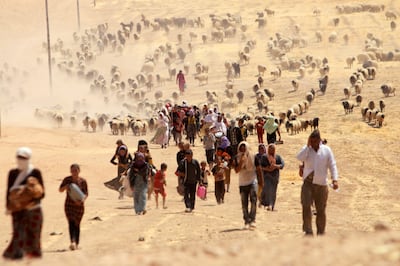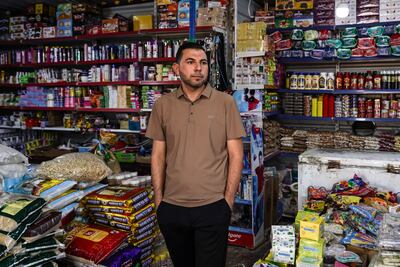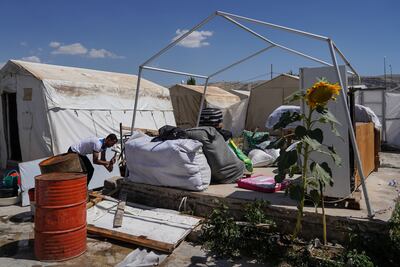For a decade, Elias Haji dreamt of returning to his beloved hometown Sinjar in northern Iraq, but this homecoming was not what he had envisioned.
Mr Haji, 80, was among tens of thousands of Yazidis who fled their ancestral homeland in 2014 when ISIS captured large areas in the country’s north and west, and ended up in tent camps.
The terror group subjected the religious minority to genocidal violence, killing more than 3,000 of them and taking about 7,000 into slavery, accompanied by widespread sexual violence.
This year, the Iraqi government decided to close all camps hosting displaced people by the end of July, leaving thousands of families with no option but to leave.
At Sharia camp, one of the many that sprung up in the aftermath 2014 ISIS onslaught in northern Iraq, Mr Haji shook hands with fellow camp dwellers, exchanging solemn nods and heartfelt goodbyes.
“We are forced to leave,” Mr Haji told The National, his face weathered by years of hardship and sorrow.
Behind him, members of his family were packing their belongings, including mattresses, a metal oven, culinary tools, an air cooler and plasticware. Nearby, a man was dismantling the tent that had been their home.
“My house is still in ruins, so I will take the tent to set it up there,” the father of three said. “We are afraid of the unknown,” he added, wearing the traditional white dishdasha and red-checkered shemagh.
As well as Yazidis, Sinjar and surrounding areas were home to other religious and ethnic groups, including Sunnis, Shiites and Christians.
For centuries, the Yazidis – who follow an ancient monotheistic religion but are falsely seen by some as devil-worshippers – lived in the mountains in north-west Iraq where their ancestral villages, temples and shrines are located.
They cite discrimination and second-class treatment by government and society, a feeling that turned them into a closed community.

In August 2014, ISIS fanatics captured Sinjar and surrounding villages, taking thousands of Yazidis captive and slaughtering others. Thousands of young women were forced into sexual slavery by the militants while mass graves containing the bodies of thousands killed are still being uncovered.
Others fled in time, escaping to nearby Mount Sinjar, where many were flown to safety by US-backed Iraqi forces. Some travelled to Syria on foot and re-entered Iraq through its Kurdistan region, which was spared the ISIS assault.
In November 2015, a US-backed patchwork of armed forces – made up of Baghdad-led troops, Kurdish fighters, Yazidi militias and Turkish Kurdistan Workers’ Party rebels, known as the PKK – took back Sinjar and surrounding villages.
Ten years later, parts of Sinjar and surrounding villages are still in ruins and the return is still a major undertaking for many of them. Public services, housing and job opportunities are still scarce.
'Not enough'
By July 30, the Iraqi government will halt all aid and services for displaced people and close all the remaining camps in Kurdistan. It argues that their areas of origin are safe now.
To encourage them, it offers each family a one-time payment of four million Iraqi dinars (about $2,750), a plasma TV, oven and refrigerator, in addition to aid parcels.
“This four million is not enough to rebuild our house, it is not enough either for food or other house stuff,” Mr Haji said. “We have no salaries or other income.”
The decision covers 23 displaced people's camps hosting 30,000 families, about 150,000 people in total, from different areas, Ali Jahakir, the spokesman of the Ministry of Migration and Displacement told The National.
“There are people heading home, but their return doesn’t meet the level of our ambition,” said Mr Jahakir, adding that only about 2,000 families had left the camps till now.

Although the Iraqi government decision to close the camps marks a significant milestone in the country’s recovery from the devastating war to defeat ISIS, it has been met with a mixture or relief and anxiety among the displaced population.
displaced Yazidi
Many of them say they are willing to return but the reality on the ground is challenging. Many areas in central and northern Iraq, including Sinjar, still bear the scars of war as infrastructure is damaged, basic services are lacking and security concerns persist.
“Of course, the life inside the camp is hard and we all want to return to our houses, but that grant is not enough. That’s why we can’t go back unless they reconsider it,” said Sirwan Khidir, 29, who runs a mini market inside the camp.
Mr Khidir said he needs at least up to 12 million dinars to repair his 120-square-metre house in Sinjar to shelter his eight-member family.
'Exaggerations'
Mr Jahakir said claims by the displaced people were exaggerated.
“They can rent a house for six months or a year using the four million dinars or take a loan to rehabilitate their house.
“Even after ten years from now, they will say the same.”
However, Nawzad Al Haji, another dweller at Sharia camp in Dahuk province, disagrees.
“We will not return,” said Mr Al Haji, 37, a resident of Al Qahtaniyah village outside Sinjar. “Half of our mud house is burnt out and all windows and doors were stolen from the second half and, therefore, we are unable to live in it.”
He remembers spending a night recently in the village.
“It was terrible,” he said. “There was no electricity, no order and the security was fragile because of the presence of different political parties. You can't feel safe there because we are poor people and it is hard for us to live among them.”
After taking back Sinjar, PKK fighters and affiliated local militias secured a foothold in the area.
Since then, they have rejected calls by the Iraqi government to withdraw, fuelling tension with Iraqi security forces. Turkish drones add to the apprehensiveness as they hunt PKK operatives with lethal air strikes.
“We will try to find a house in Kurdistan to rent,” Mr Al Haji said.

Barriers to Sinjar return
Human Rights Watch has warned that the camp closures “will imperil the rights of many camp residents” from Sinjar.
In a report issued last month, the New York-based rights watchdog said Sinjar “remains unsafe and lacks adequate social services to ensure the economic, social and cultural rights of thousands of displaced people who may soon be forced to return”.
Eighty per cent of public infrastructure and 70 per cent of homes were destroyed between 2014 and 2017, it added.
Sinjar General Hospital remains damaged and abandoned, with medical staff still operating out of a location that was meant to be temporary, the report said.
Out of 206 schools that existed before 2014, only 86 are operational but they are overcrowded and struggling with a shortage of teachers, it said.
The report cited the main barriers to the return of Yazidis as the government’s failure to provide compensation for the loss of property and livelihoods, delayed reconstruction, an unstable security situation and a lack of justice and accountability for crimes and abuses committed against them.
By February 2024, the number of completed claims stood at 8,300 but “still not a single person had received any payment”, the report said.
Sarah Sanbar, an Iraq researcher at HRW, was quoted in the report as saying Sinjar's residents “deserve to be able to go home, but returns need to be safe and voluntary”.
“Given the lack of services, infrastructure and safety in the district, the government risks making an already bad situation worse,” she said.

